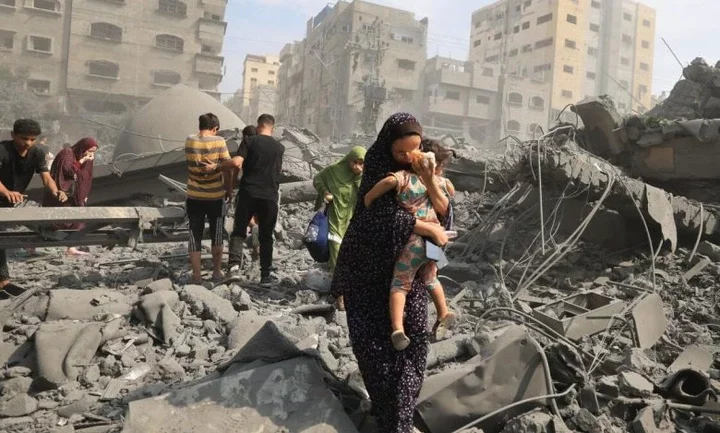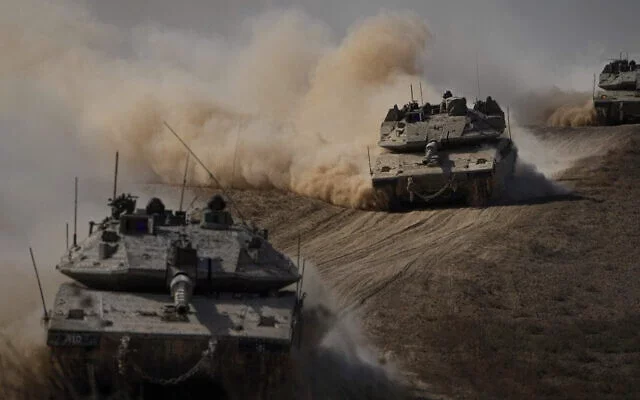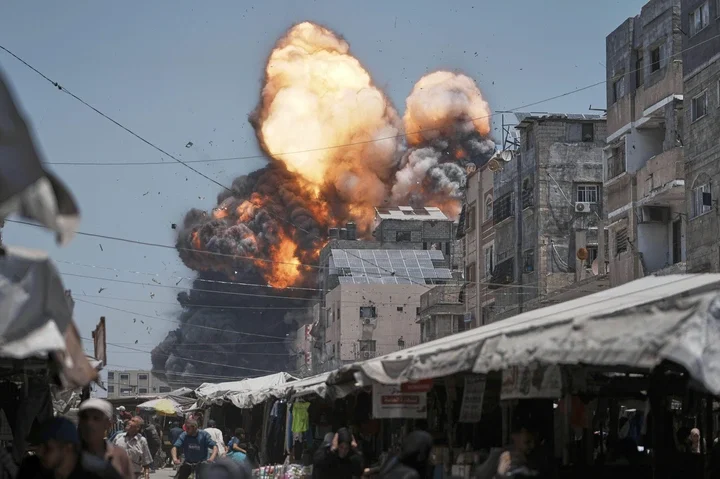
The Israel military pulverized the Hamas-ruled Gaza Strip with airstrikes, prepared for a possible ground invasion and said Thursday its complete siege on the territory - which has left Palestinians desperate for food, fuel and medicine - would remain in place until Hamas militants freed some 150 hostages taken during a deadly weekend incursion.
A visit by Secretary of State Antony Blinken, along with shipments of U.S. weapons, were a powerful green light to Israel to drive ahead with its retaliation in Gaza after Hamas' grisly weekend attack, even as international aid groups warned of a worsening humanitarian crisis. Israel has halted deliveries of basic necessities and electricity to Gaza's 2.3 million people and prevented entry of supplies from Egypt.
"Not a single electricity switch will be flipped on, not a single faucet will be turned on, and not a single fuel truck will enter until the Israeli hostages are returned home," Israeli Energy Minister Israel Katz said on social media.
Lt. Col. Richard Hecht, an Israeli military spokesman, told reporters Thursday that forces "are preparing for a ground maneuver" should political leaders order one. A ground offensive in Gaza, where the population is densely packed into a sliver of land only 40 kilometers (25 miles) long, would likely bring even higher casualties on both sides in brutal house-to-house fighting.
Hamas' assault on Saturday killed more than 1,300 people in Israel, including 247 soldiers - a toll unseen in Israel for decades - and the ensuing Israeli bombardment has killed more than 1,400 people in Gaza, according to authorities on both sides. Israel says roughly 1,500 Hamas militants were killed inside Israel, and that hundreds of the dead in Gaza are Hamas members.
As Israel pounds Gaza from the air, Hamas militants have fired thousands of rockets into Israel. Amid concerns that the fighting could spread in the region, Syrian state media reported that Israeli airstrikes on Thursday put two Syrian international airports out of service.
The relentless barrage on Gaza - 6,000 munitions dropped since the conflict began, the military said - left Palestinians running through streets with what belongings they could carry, looking for a safe place.
Strikes in the Jabaliya refugee camp Thursday afternoon collapsed two residential buildings and killed dozens of people belonging to several families sheltering inside, said a neighbour, Khalil Abu Yahia. The toll was not immediately confirmed.
The camp has seen non-stop bombardment for days. "We can't flee because anywhere you go you are bombed. You need a miracle to survive here," Aby Yahia said.
The number of people who fled their homes reached 340,000 people by Wednesday night - roughly 15% of Gaza's population. Most crowded into U.N.-run schools while others are staying with relatives or even strangers.
Families were cutting down to one meal a day to conserve supplies, said Rami Swailem, a 34-year-old lecturer at al-Azhar University, who has 32 members of his family sheltering in his home. Water stopped coming to the building two days ago, and they were rationing what's left in the tank on the roof.
Alaa Younis Abuel-Omrain has been staying in a U.N. school after a strike on her home killed eight members of her family - her mother, aunt, a sister, a brother and his wife and their three children. She said food supplies were running out. Most bakeries stopped producing bread for lack of electricity.
"Even if there is food in some areas, we can't get to it because of strikes," she said.
On Wednesday, Gaza's only power station ran out of fuel and shut down, leaving only lights powered by scattered private generators.
Hospitals, overwhelmed by a constant stream of wounded and running out of supplies, have only a few days' worth of fuel before their power cuts off, aid officials say.
"Without electricity, hospitals risk turning into morgues," said Fabrizio Carboni, regional director of the International Committee of the Red Cross. Newborn incubators, kidney dialysis machines, X-rays, and more, are all dependent on power, he said.
Ambulance crews carrying bodies from the rubble of demolished buildings to the morgue at Gaza's biggest hospital, Shifa, found no space left. Dozens of bodies in body bags were lined up in the hospital parking lot. Fourteen health facilities have been damaged in strikes, health officials said Thursday.
"The situation is very critical," said Shifa hospital director Mohammad Abu Selmia. "We've never seen days in Gaza like what we see now."
With Israel sealing off the territory, the only way in or out is through the crossing with Egypt at Rafah. Egypt's Foreign Ministry said it has not officially closed Rafah but airstrikes have prevented it from operating. Egypt has been trying to convince Israel and the United States to allow the delivery of aid and fuel through Rafah.
Israeli Prime Minister Benjamin Netanyahu vowed to "crush" Hamas after the militants stormed into the country's south on Saturday and massacred hundreds of people, including killing of children in their homes and young people at a music festival. Netanyahu said Hamas' atrocities included beheading soldiers and raping women, descriptions that could not immediately be independently confirmed.
Amid grief and demands for vengeance among the Israeli public, the government is under intense pressure to topple Hamas rather than continuing to try to bottle it up in Gaza.
Four previous conflicts ended with the group still firmly in control of the territory it has ruled since 2007. Israel has mobilized 360,000 reservists, massed additional forces near Gaza and evacuated tens of thousands of residents from nearby communities. A new war Cabinet, which includes a longtime opposition politician, was sworn in on Thursday to direct the fight.
A high-ranking Hamas official, Saleh Al-Arouri, warned on Thursday that any Israeli invasion of Gaza "will turn into a disaster for its army," saying the group was prepared to respond.
Blinken's visit underscored American backing for Israel's retaliation.
"You may be strong enough on your own to defend yourselves, but as long as America exists you will never have to," Blinken said after meeting with Netanyahu in Tel Aviv.
Blinken said he told Netanyahu "it's so important to take every possible precaution to avoid harming civilians."

















Comments